Labour History
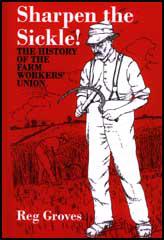
Title: Sharpen the Sickle!
Author: Reg Groves
Editor:
Publisher: Merlin Press
Price: £14.95
Bookshop: Amazon
Spartacus Website: Agricultural Labourers Union
Category:
For many years, farm workers fought to rescue themselves from bleak, soul-destroying poverty. Their victories and their bitterest defeats, from the cruel treatment of the Tolpuddle Martyrs to the false dawn of the Second World War are recounted in Sharpen the Sickle. "It is the history of the awakening of the exploited rural poor. It shows us the times, the way workers and their families lived. Every page brings alive, the privation and bitterness that made farm workers among the first to organize themselves into a Union and to take on their exploiters. And it does not hesitate to criticize the men who led them and the decisions taken." Jack Boddy, General Secretary of the National Union of Agricultural and Allied Workers.
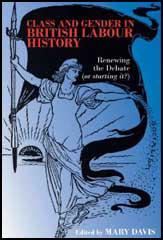
Title: Class and Gender in British Labour History
Author: Mary Davis (edited)
Editor:
Publisher: Merlin Press
Price: £16.95
Bookshop: Amazon
Spartacus Website: Trade Union Movement
Category:
Politics constructs gender and gender constructs politics: this is a central theme in this collection of essays which seek not only to write a history that focus on women's experiences but seeks also to analyse those dynamic forces that have shaped that history. It examines the 'making' of the other half of the working class - women - as workers, trade unionists and political activists, and seeks to weave together intricate relationship between class and gender, particular within the process of industrialization. It is because the class/gender relationship has often been either ignored or misunderstood that it has been possible to write general histories of the labour movement in which women are hardly mentioned. It features contributions from leading and up-and-coming women labour historians, essays are in three sections: the labour market/work (typical and atypical); trade unions; and politics.
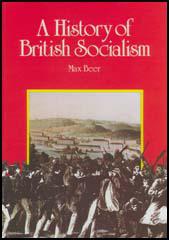
Title: A History of Socialism
Author: Max Beer
Editor:
Publisher: Spokesman Books
Price: £11.95
Bookshop: Amazon
Spartacus Website: Socialism
Category:
Max Beer's History of Socialism is a classic, not only because it was a brilliant pioneering study, but also because it is still urgently relevant to a new generation of socialists. Just as Beatrice Webb complained that her comrades had "borrowed" it, while Tawney celebrated it in a justly famous essay, so today there are many who will treasure its radical insights into the ideas of these British thinkers, many of whom have long been ignored or forgotten in most of our schools and some of our universities.
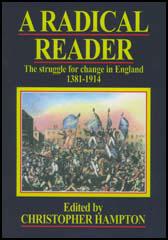
Title: A Radical Reader: The Struggle for Change
Author: Christopher Hampton
Editor:
Publisher: Spokesman Books
Price: £11.95
Bookshop: Amazon
Spartacus Website: Socialism
Category:
This major anthology spans 500 years of radical protest from the Peasants’ Revolt to the First World War. Provides an alternative political and social history of England. This is history as creative defiance, as communal action, involving the intellectual and imaginative witnesses of those among the privileged poets, writers, and thinkers who have had the strength and courage to make themselves passionate spokesmen for the dispossessed.
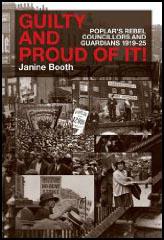
Title: Guilty and Proud of It!
Author: Janine Booth
Editor:
Publisher: Merlin Press
Price: £12.95
Bookshop: Amazon
Spartacus Website: George Lansbury
Category:
In the aftermath of the First World War, thirty Labour councillors went to prison rather than accepting inequitable taxes. With unemployment rising in 1921 in Bow, Limehouse, Millwall and Old Ford, Poplar Borough Council could not help provide relief drawing only on the limited wealth of one poor London borough. Poplar councillors, including future labour leader George Lansbury, demanded that rates from richer areas should help. Rich Kensington had a hugely greater rateable value and fewer jobless people; it could afford to pay more. So Poplar refused to pay over rates to the London County Council, and thus began the Poplar Revolt. Drawing on archive research and on newspaper reports, this book tells the story of the support mobilised by Poplar Council. The story begins when newly-enfranchised working-class voters elected Labour to run the Council in 1919. For the next two years, it improved life for Poplar residents, coming into ever-increasing conflict with the central authorities and the local government funding system. The crisis came in 1921, when Poplar Council refused to levy a portion of its rates. Poplar's fight took its Councillors to prison in September 1921. Released after one month, they continued to battle but the struggle lost momentum. The book ends with a survey of outcomes and considers how this story has meaning today.
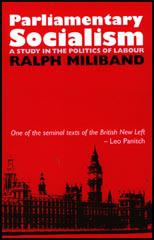
Title: Parliamentary Socialism
Author: Ralph Miliband
Editor:
Publisher: Merlin Press
Price: £16.95
Bookshop: Amazon
Spartacus Website: Ralph Miliband
Category:
An analysis of the Labour Party from its early days up to the 1960s with a 1972 postscript reflecting on the Labour government of Harold Wilson [1964-1970]. Of political parties claiming socialism to be their aim, the Labour Party has always been one of the most dogmatic - not about socialism, but about the parliamentary system. Empirical and flexible about all else, its leaders have always made devotion to that system their fixed point of reference and the conditioning factor of their political behaviour. This is not simply to say that the Labour Party has never been a party of revolution: such parties have normally been quite willing to use the opportunities the parliamentary system offered as one means of furthering their aims. It is rather that the leaders of the Labour Party have always rejected any kind of political action (such as industrial action for political purposes) which fell, or which appeared to them to fall, outside the framework and conventions of the parliamentary system. The Labour Party has not only been a parliamentary party; it has been a party deeply imbued by parliamentarism. And in this respect, there is no distinction to be made between Labour's political and its industrial leaders. Both have been equally determined that the Labour Party should not stray from the narrow path of parliamentary politics.
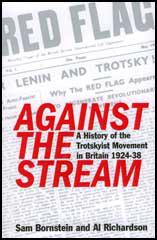
Title: Against the Stream
Author: Sam Bronstein & Al Richardson
Editor:
Publisher: Merlin Press
Price: £18.95
Bookshop: Amazon
Spartacus Website: British Communist Party
Category:
Against the Stream documents the way that the rift between Stalin and Trotsky resounded in Britain. In 1930 some British left-wing activists formed a Trotskyist network that was antagonistic to the Stalinist USSR and sought to influence the mainstream British labour movement. The book has grown out of interviews with many of these the protagonists and research among the published documents and private correspondence of the period. It charts the history of Trotskyism in Britain from the first echoes of the Stalin-Trotsky faction fight, through to the emergence of the Fourth International in 1938. The authors aim to clarify some of forgotten historical and theoretical background to the tactics adopted by the Trotskyist faction and explain the movement's evolution into different millieux. It presents its picture 'warts and all' irrespective of orthodoxies, whether left or right.
